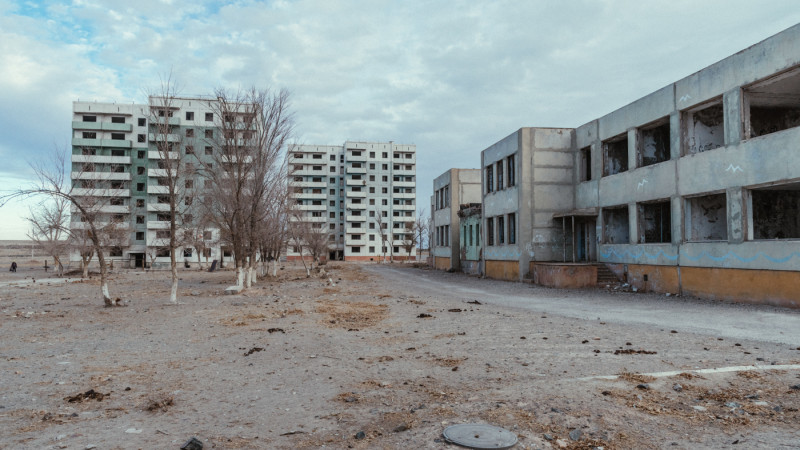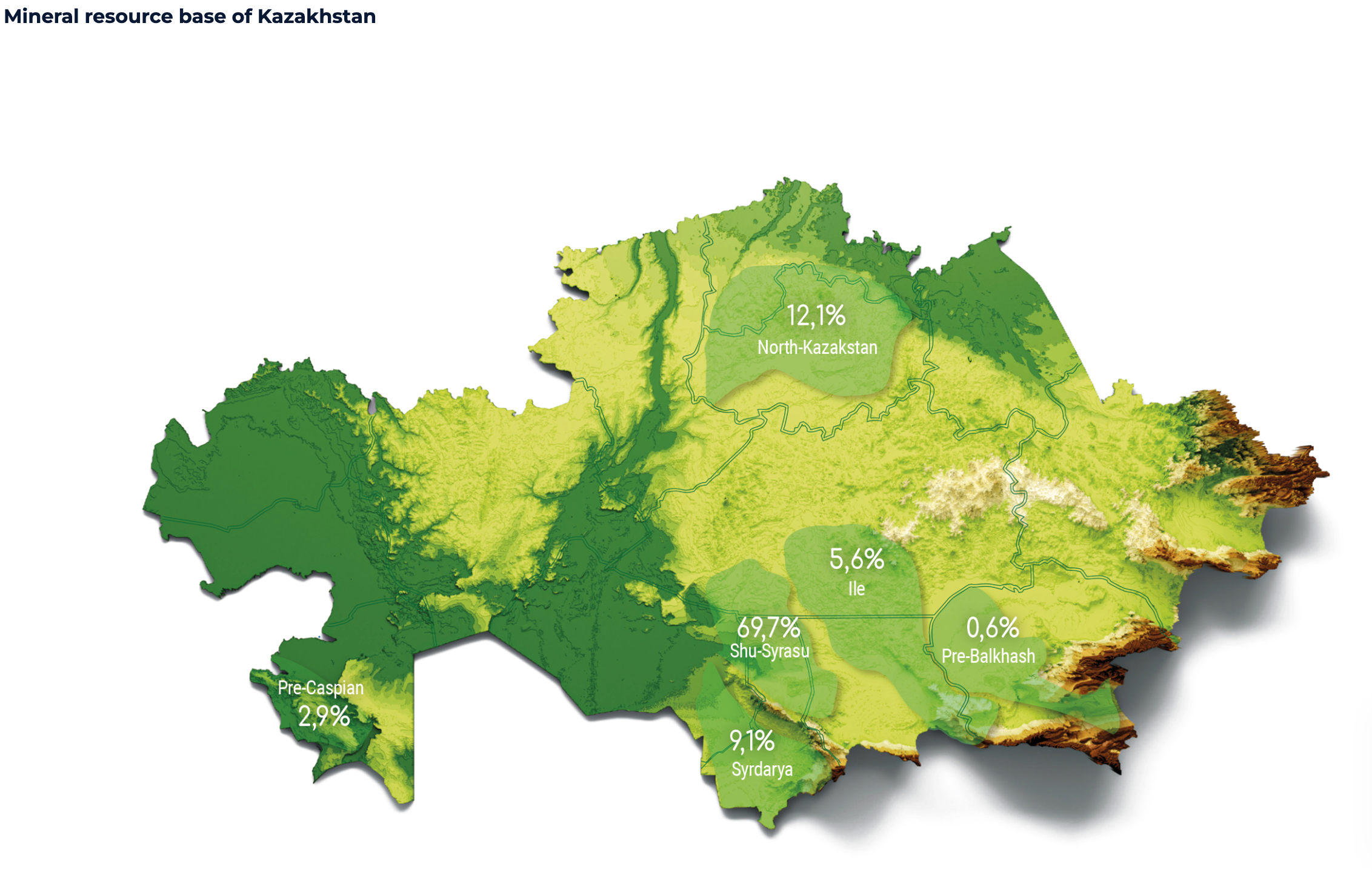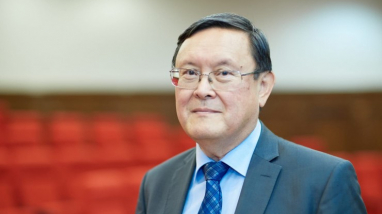ASTANA – Ulken village in the Almaty Region is expected to host public hearings on Aug. 22 to decide on the construction of a nuclear power plant, a topic of heated public debate in Kazakhstan.

Construction of a nuclear power plant has long been a topic of heated public debates in Kazakhstan. Click to see the map in full size. Photo credit: Kazakh Energy Ministry. Map is designed by The Astana Times.
Ulken is located in the Almaty Region on the western shore of Lake Balkhash, some 370 kilometers from Almaty. Kazakhstan was choosing between this village and the town of Kurchatov in the Abai Region as a location for a nuclear power plant.
In May 2022, the interdepartmental commission on the development of Kazakhstan’s nuclear industry proposed to select the village of Ulken.
The decision to build a nuclear power plant in Ulken was not without controversy. The public expressed concerns about the safety of a nuclear plant in such a seismically active region.

Ulken village is home to nearly 1,500 people. Photo credit: tengrinews.kz
Ulken is a relatively young village founded in the early 1980s. It was originally built to house workers who were constructing the South Kazakhstan Hydroelectric Power Plant, which was never completed.
Idea of a Kazakh nuclear power plant is not new
The construction of a nuclear power station has long been on the national agenda, even before President Kassym-Jomart Tokayev voiced the idea in his state-of-the-nation address in 2021.
Kazakhstan Nuclear Power Plant (KNPP) company, a subsidiary of Samruk Kazyna Sovereign Wealth Fund, which has been designated as the future plant operator, began preparing a feasibility study in 2018 to justify the need for nuclear power and the selection of the location for its construction.
A nuclear power plant is expected to have two reactors with a capacity ranging from 1,000 to 1,400 megawatts to cover the shortage of base capacity.
According to Tokayev, the looming energy deficit forces countries to look for new energy sources. In the wake of recent disruptions to Kazakhstan’s power supply system, constructing a nuclear power plant is back on the agenda.
“Global experience suggests the most optimal solution – a peaceful atom. The question is not an easy one. Therefore, it is necessary to approach its solution as rationally as possible, without speculation and emotions,” said the Kazakh President, tasking the government and Samruk Kazyna to explore the possibility of developing safe and environmentally friendly nuclear energy in Kazakhstan.
In February 2022, Tokayev addressed an expanded government meeting, saying that without clean nuclear energy, Kazakhstan “will lose the entire economy, not to mention investments, and lose regional leadership.”

Kazakhstan’s uranium mineral resource base. Photo credit: Kazatomprom national company
Kazakhstan possesses the world’s second-largest uranium reserves, accounting for 14% of the global total. It runs research reactors and a range of other nuclear facilities associated with the initial stages of the nuclear fuel cycle, including activities like uranium extraction.
Why nuclear energy?
Globally, nuclear energy accounts for nearly 10% of electricity generation, reaching almost 20% in advanced economies, according to data from the International Energy Agency (IEA). Nuclear energy is said to be one of the largest global contributors to carbon-free electricity, with vast potential to contribute to power sector decarbonization.
Nuclear energy, with a global capacity hitting nearly 413 gigawatts in 32 countries, prevents 1.5 gigatonnes of global emissions and 180 billion cubic meters of global gas demand annually. Nuclear power can go hand in hand with renewable energy sources in helping countries ensure a smooth, clean energy transition, an ambitious goal for Kazakhstan.
Nuclear energy provides a consistent and reliable source of baseload electricity, unlike some renewable sources like solar and wind, which are intermittent.
Besides its positive impact on the country’s energy security, experts note economic benefits too.
At a June 2 roundtable discussion in Almaty on the nuclear industry, KNPP CEO Timur Zhantikin said the construction of the nuclear power plant will have a multiplier effect on the country’s development.

Timur Zhantikin has led the Kazakhstan Nuclear Power Plant company since 2018. Photo credit: knpp.kz
“An increase in the scientific, technical and highly qualified personnel potential of the country is predicted. It will be necessary to create up to 8,000 new jobs during construction and find up to 2,000 high-quality personnel for the operation. As a rule, one job while constructing a nuclear power plant creates another ten in related sectors of the economy,” he told the roundtable.
Challenges and concerns
The nuclear power plant has sparked many controversies in Kazakhstan, a country with a tragic legacy of nuclear testing, where people are understandably cautious about any activities related to nuclear technology.
The legacy of nearly 450 nuclear tests conducted by the Soviet Union and the detrimental long-term consequences on the health of the population and environment resonates deeply within Kazakhstan, raising valid safety concerns among the public.
Following several incidents at heat and power plants in the country last year, questions are being asked whether this can occur at a future nuclear power plant too.
Another concern in constructing a nuclear power plant is the availability of water. Nuclear power plants usually require water for cooling. Water consumption of nuclear power plants can exacerbate water scarcity issues in areas where water resources are scarce or experiencing stress. Balkhash falls into this category.
Bulat Yessekin, an expert on water, environment and climate change, is concerned about the potential environmental impact if the plant is constructed on the shores of Balkhash Lake. He said the lake could suffer the fate of the Aral Sea, which has shrunk to 10% of its original size because of unsustainable cotton cultivation under the Soviet Union.
“We will simply hasten the death of Balkhash. As a result, there will be neither a nuclear power plant nor Balkhash. Balkhash is a major ecological regulator in the entire Balkhash system, including Almaty, Karagandy, Zhambyl regions and the city of Almaty. This can impact the entire ecosystem of the basin, which includes more than 50,000 rivers, reservoirs, watering places (…). Water problems are the main barrier to economic development in the future. Over a billion people will be climate refugees in the next decade. These are serious questions. We cannot ignore them,” said Yessekin.
Experts also agree that if a decision is made to build a nuclear power plant, the country needs to expand the regulatory framework and train highly qualified personnel to prepare and run the plant.
Latest developments
In February, the Kazakh Ministry of Energy said four companies had been short-listed as potential providers of reactor technology – China National Nuclear Corporation, Russia’s Rosatom, French EDF, and Korea Hydro & Nuclear Power Company.
Gulmira Mursalova, deputy director of the Department of Atomic Energy and Industry at the Kazakh Energy Ministry, explained that few light-water reactor manufacturers exist worldwide. She noted over 13 technologies were considered from six global manufacturers, with Kazakhstan placing primary emphasis on the safety of the technology when making selections.
“Due to the fact that there are no operational nuclear power plants in Kazakhstan today, it is still acceptable for us to initially consider the existing experience of operational and reference technologies. We have chosen light-water reactors of high capacity, 1,000 – 1,200 megawatt,” said Mursalova at a roundtable in June in Almaty.
KNPP CEO Timur Zhantikin said if a supplier is selected this year and the government decides on the location of the nuclear power plant, the feasibility study will be completed by 2025, and it will be submitted for the state examination. If a favorable decision from the state examination is reached, the study will be submitted to the government for the final decision on the construction of the nuclear power plant. Subsequently, the work on design and project cost estimate documentation will commence.
However, some top officials are cautious about the idea of a nuclear power plant. Speaking to journalists in July, Samruk Kazyna CEO Nurlan Zhakupov said the decision to construct a nuclear power plant is still pending and should be made carefully.
He said it’s important to consider factors such as water availability and the affordability of the plant’s construction.
“There are so many factors that influence whether there will be a nuclear power plant in Kazakhstan or not. After we make this decision, we can talk about which manufacturer we will work with. There are issues related to the location of the plant. We need to understand and decide on the location, as there are a number of factors, including water and ecology,” Zhakupov said.
International partnerships
Before making a final decision, Kazakhstan must ensure its nuclear infrastructure is ready. The International Atomic Energy Agency experts visited Kazakhstan in 2016 for an eight-day Integrated Nuclear Infrastructure Review (INIR) mission to review the country’s overall nuclear infrastructure, including its legal, regulatory, technical, and human resource capabilities for developing a peaceful nuclear program.
In March 2023, the International Atomic Energy Agency (IAEA) and international experts revisited the country, concluding that Kazakhstan has made progress in implementing the experts’ recommendations.
The team assessed the progress of nuclear infrastructure advancement by employing the Phase 1 criteria laid out in the IAEA’s Milestones Approach. The Initial Phase 1 assesses a nation’s preparedness to make an informed commitment to a nuclear power program. This three-stage framework helps nations consider, prepare for, and construct a nuclear power plant.
Experts noted that further work is needed to assess the funding requirements for nuclear power infrastructure, plan for the development of the Kazakhstan Nuclear Power Plant company and develop a policy for incorporating the nuclear power program into the country’s industrial framework.

